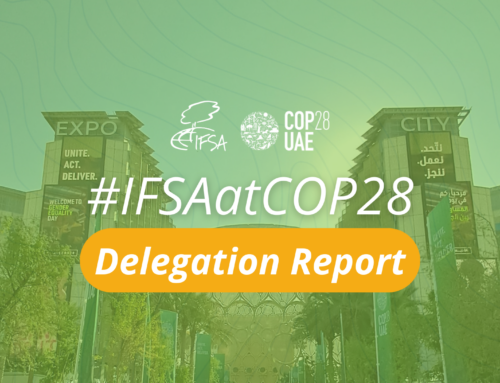“Mangroves in the Tropics: Realizing their Potential for Climate Change Mitigation and Adaptation” touched upon the importance of mangrove ecosystems in the climate debate. Mangroves are crucial ecosystems. They cover a total of 15 million hectares worldwide, and are evident in 118 tropical and subtropical countries and territories. However, they are under threat: since 1980, the total covered area has declined by 20%. Moreover, more than a quarter of the remaining mangroves are degraded to some extent. This is problematic in several ways. For one thing, the decline in mangrove ecosystems impacts upon the wellbeing of coastal communities worldwide. During the side event, Dr. Masripatin of the Indonesian Ministry of Environment & Forestry discussed this livelihood component of mangroves. She highlighted how mangroves facilitate ecotourism, fishing and education, while providing shelter, fuel and (non) wood products. The conservation and restoration of mangroves can thus help to stimulate climate resilience in food, water and energy. Ms. Ndjebet from the organization REFACOF emphasized how mangrove conservation and restoration benefits women in her country, Cameroon, specifically. This is due to the fact that women are engaged with several activities surrounding mangroves such as nursery establishment and agroforestry. The panelists also discussed how mangroves function as natural ‘shields’, providing protection against natural disasters such as tsunamis or storms. Moreover, they talked about the fact that mangroves are among the biomes storing the highest carbon densities in the world. Restoring degraded mangroves as well as adequately conserving these ecosystems thus contributes to climate action. Amongst other solutions, the panelists highlighted the importance of prioritizing the conservation and sustainable management of mangroves in national policies, laws and regulations as well as raising awareness regarding mangrove degradation. Moreover, they discussed how international financing mechanisms might help to bolster climate change mitigation and adaptation while increasing the resilience of coastal communities. Ultimately, it is in the favor of humanity to protect mangroves worldwide. Sofia Caycedo is originally from the Netherlands, but she is currently studying Environmental Management at Yale University with a focus on environmental economics & policy. She is very interested in the economic questions related to sustainable development and climate change. She feels strongly about the fact that forests play a crucial role in the path towards climate resilience. Sofia excited to be representing IFSA at COP23!]]>
About the Author: Simone Massaro
Head of Web Subcommission 2018-2020




